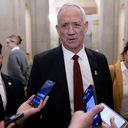Israeli minister Benny Gantz lambasted at White House over Gaza aid crisis

Israeli minister Benny Gantz encountered harsh criticism and tough questions about the dire humanitarian crisis in Gaza and Israel's war strategy during his meeting with Vice President Kamala Harris and National Security Adviser Jake Sullivan at the White House on Monday, three Israeli and U.S. officials said.
Why it matters: Gantz, who is considered a more moderate member of the Israeli war cabinet, absorbed a lot of the frustration the White House has with the Israeli government right now, a U.S. official said.
- The strong messages Gantz received in private, which were accompanied by stronger public criticism from the Biden administration in the last 48 hours, signal the White House has lost its patience and is ratcheting up pressure on the Israeli government.
- Gantz's visit to the White House enraged Israeli Prime Minister Netanyahu who ordered the Israeli embassy in Washington to not take any part in the visit or assist Gantz in any way.
- Gantz is a political rival of Netanyahu, who is under increasing pressure in Israel as calls mount for early elections.
The big picture: The aid convoy disaster in Gaza last Thursday, during which more than 100 Palestinians were killed, was a turning point for the Biden administration, U.S. officials tell Axios.
- U.S. officials saw it as an event that embodied all the Israeli policy failures in Gaza and were surprised about the indifference on the Israeli side about what happened.
- Biden decided last Friday to start U.S. air drops of aid in Gaza accompanied by a strong-worded statement by the president who said Israel must facilitate more aid into Gaza. "No excuses", the president said.
- On Sunday, Harris used her speech in the symbolic location of Selma, Alabama, to stress that "people are starving in Gaza." She called the situation there a "humanitarian catastrophe" and reiterated Biden's "no excuses" message to Israel. The United Nations has warned "famine is almost inevitable" in Gaza if nothing changes.
Driving the news: Shortly before Gantz arrived at the White House on Monday, Biden tweeted: "There are no excuses. The aid flowing into Gaza is nowhere near enough – and nowhere fast enough."
- Around the same time, Secretary of State Antony Blinken called Netanyahu's confidant, minister Ron Dermer, about the issue. In an unusual move, the State Department shortly after made the call public.
- "Blinken pressed Dermer that more must be done to get aid into Gaza, to ensure that the delivery of aid is sustained into Gaza, and to ensure that once aid gets into Gaza it can be distributed to those who need it," State Department spokesman Matthew Miller said in a press briefing.
- "We will continue to press them to allow more aid in. The government of Israel tells us that they want to ensure that aid gets to those who need it. But ultimately it's the results that matter, not the intent. And right now not enough aid is getting in and not enough aid is getting distributed, and that needs to change," Miller said.
Behind the scenes: A senior Israeli official said that already after the meetings Gantz had on Sunday to prepare for the meetings with White House and State Department officials, the Israeli minister started realizing the Israeli government "is in deep shit" when it comes to how the U.S. sees Israel's responsibility for the humanitarian crisis in Gaza.
- Gantz spent three hours at the White House. Harris and Sullivan both pressed Gantz on the humanitarian situation and said Gaza "needs to be flooded" with aid and it is Israel's responsibility to find solutions that will allow it to happen, Israeli and U.S. officials said.
- The Israeli official said Harris told Gantz the administration wants to continue backing Israel, but the Israeli government needs to do its part. "The Vice President said: help us help you," the Israeli official said.
- The official said Gantz wasn't only surprised by the strength of criticism about the humanitarian crisis but also about how far apart Israel and the U.S. are when it comes to a possible operation in Rafah.
Zoom in: Harris and Sullivan asked Gantz where Israel is planning to move more than one million Palestinian civilians who are in Rafah and expressed deep skepticism it is even possible, two U.S. and Israeli officials said.
- Gantz tried to reassure Harris and Sullivan that Israel won't go into Rafah without evacuating the civilian population and stressed Israel has ways to do it, but also realized the White House doesn't believe the previous assurances received from Netanyahu about this issue, the senior Israeli official said.
- Another pessimistic message Gantz received at the White House was that the chances are slim of reaching the mega-deal with Saudi Arabia that includes normalization with Israel as long as the war continues and as long as the Israeli government is unwilling to chart a path for a Palestinian state, the Israeli official said.
Between the lines: The senior Israeli official said Gantz's conclusion was his visit to Washington was two months too late. "There is a big difficulty right now in the relations with the U.S. and we have to find a way to overcome it," the official said.